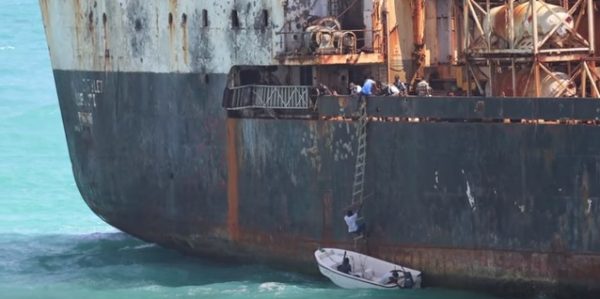In a series of issue papers called “Defining Contracted Maritime Security”, Oceans Beyond Piracy (OBP) seeks to define various models of contracted maritime security and touches upon the matter of Coastal State Embarked Personnel.
As defined in the paper, models of contracted maritime security include:
- Private Maritime Security: Embarked private security force personnel hired by the shipping industry
- Vessel Protection Detachments: Uniformed military personnel embarked on a vessel with explicit approval of the Flag State
- Coastal State Embarked Personnel: Embarked armed personnel originating from the Coastal State, based on arrangements between ship operators and the providing national authorities – not specifically endorsed by the Flag State
- State Affiliated Escort: Escort by a State military asset
The shipping industry has used several models of contracted maritime security in order to protect vessels and seafarers. This trend has resulted in a increase of weapons at sea and various types of armed security teams operating aboard private commercial vessels.
This fact can possibly increase incidents of violence at sea and hinder efforts to pursue sustainable rule of law solutions to maritime criminality, OBP reports.
In the Gulf Guinea, the nations are using Privately Contracted Armed Security, a model of embarked maritime security, which involves the contracting of uniformed police or military personnel from coastal or port states onto a vessel in the anchorage, port, or territorial waters of that state.
This happens mainly in Nigeria, Togo, and Benin. The coastal states in this region do not allow private armed security guards of any kind to engage in vessel protection activities in their waters.
Instead, the military and/or police forces of the coastal state offer their own security services, for a fee, to private ship-owners in the region.
In Somalia, there are examples of regional authorities requiring the employment of specific armed security agencies on vessels in Somali territorial waters and EEZ.
In particular examples of this include the use of embarked teams on trawlers and other fishing vessels that were granted regional fishing licenses and vessels conducting surveying work in the Somali basin.
As far as South East Asia is concerned, the traditional model of employing Private Maritime Security cannot be used in the most of the shipping lanes in this region.
Instead, some shippers have begun working with private companies to arrange for embarked armed security in the form of Government Forces from coastal states in the region.
According to a PMSC active in the area, three countries; Indonesia, Malaysia and the Philippines are offering to employ their forces through a third party to protect vessels sailing through their Territorial Waters (TTW).
This OBP paper focuses on what happens the Gulf of Guinea.
Namely, due to limitations imposed by coastal states in the Gulf of Guinea region, operators who want additional security measures for their vessels have turned to private maritime security companies (PMSCs) which have established operations in the area.
These companies have established communication with the relevant Gulf of Guinea coastal states to arrange for security services provided by the Navy or Police, or employ the help of a local liaison to manage the interface between the ship-operator and the Navy or Police.

The use of these companies have risen some serious ambiguities and challenges, which can be summarized as following:
- Defining the status of the guards on client vessels under laws of the flag state, coastal state, international law, and commercial law – especially with regard to insurance claims.
- Command structure of these coastal state embarked personnel. Operating offshore, these guards must make decisions alone on which course of action to take in response to an armed threat.
- The Use of Force or Rules of Engagement for these coastal state embarked personnel undertaking vessel protection duties. This can pose a serious danger when the coastal state embarked security guards are insufficiently trained on the Rules for the Use of Force or unaware of any Rules at all.
- Assessing the procurement system in place for obtaining and providing services from coastal state embarked personnel.
“In order to improve the efficiency and safety of security services offered by coastal states in the Gulf of Guinea, it is necessary to bring transparency to this system. Once these models are better understood, stakeholders could consider encouraging relevant governmental authorities to standardize systems and procedures for embarking governmental security personnel, improve security training and Use of Force awareness, streamline operational efficiency, and discourage possible corrupt practices,” OBP concludes.
Before this report, OBP had released another paper regarding State Affiliated Escorts.
The escort service involves a state-owned warship escorting a merchant vessel or a convoy of merchant vessels through dangerous waters. The mandates of Coalition Forces including CTF-151, NATO Operation Ocean Shield, and EUNAVFOR Operation Atalanta focus on anti-piracy patrol operations, but, occasionally, they provide escorts for merchant ships delivering humanitarian aid or involved in peacekeeping operations, OBP reports.
For more information about the Coastal State Embarked Personnel, click in the PDF below





























































